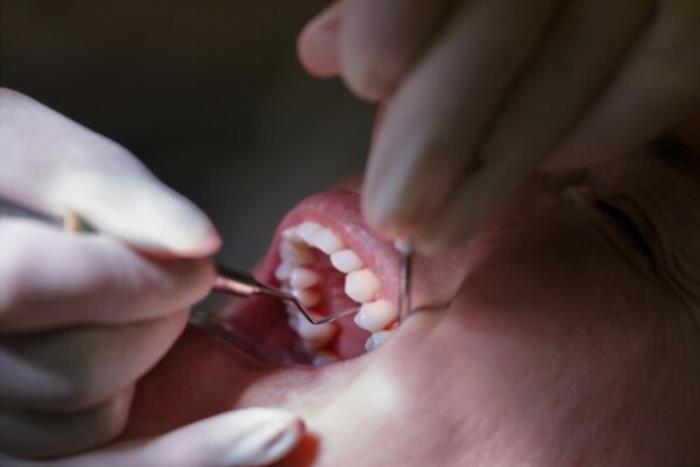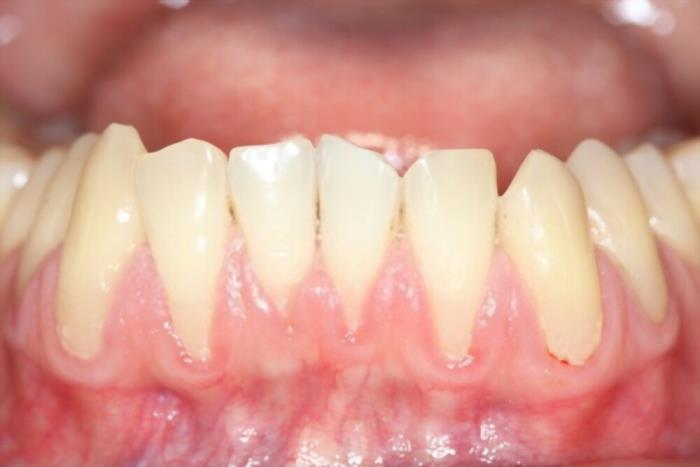Receding gums: Causes and treatment
Discovering about receding gums and the related problems can help you better understand this health condition, thereby increasing awareness of prevention. At the same time, you will also know how to recognize early signs of receding gums, so that intervention can be made right from the start.
Oral health conditions refer to the health of teeth and gums. In particular, receding gums is one of the most common problems that most of us may experience. However, not everyone knows what receding gums are as well as the root causes, treatments, and effective prevention.
If you also wonder about this information, let's find the answer through the article below.
What is receding gums? Signs and symptoms of receding gums
Receding gums or gum recession refers to the process in which the margin of the gum tissue surrounding the teeth wears away, or pulls back, exposing more of the tooth, or the tooth's root. This not only affects our appearance but also contributes to the development of serious problems such as infection, tooth decay or even tooth loss.

A person with receding gums will usually experience the following unusual symptoms:
-
Visible red swollen gums, painful to the touch, especially in the gumline
-
The gum tissue pulls back, while the crowns may look longer than normal (due to the tooth’s root exposure).
-
Teeth are not fixed, easily feel loose
Moreover, sometimes receding gums is a warning sign of some underlying oral health problems that can lead to certain symptoms, such as:
-
Bleeding teeth after flossing or brushing
-
Bad breath that causes discomfort and a lack of confidence when communicating with other people
Causes of receding gums
In general, the cause of gum recession mainly comes from poor hygiene and dental care. This creates a chance for bacteria to stick and thrive in the teeth, which gradually turns into tartar. High tartar accumulation can cause periodontitis. At that time, the bacteria will attack and "erode" the soft or gingival tissue directly, gradually exposing the roots below.
Besides, brushing your teeth vigorously or using a hard-bristled toothbrush can damage your tooth enamel and push back the gums.
In addition, receding gums are sometimes caused by some certain risk factors, such as:
-
Genetics
-
Age, especially people aged 65 years and older
-
Smoking habit
-
Certain health conditions such as diabetes, HIV/AIDS, cancer, etc.
-
Female hormonal imbalance
How to treat receding gums effectively?
Depending on the severity, there are many effective and appropriate methods to treat receding gums.
Mild gum recession

In this case, the most appropriate treatment would be to deeply clean the area with receding gums, which includes these following steps:
-
Carefully remove plaque and tartar that builds up on the tooth surface, tooth root as well as below the gum line
-
Smooth the roots to prevent bacteria from building up and forming tartar again
Occasionally, your dentist may also prescribe some antibiotics to remove bacteria that may be still remaining after the treatment.
Severe gum recession
If the gum has severely receded, the above method will not be able to bring about the desired result. At this point, you will need to combine deep cleaning (scaling and root planing) with dental surgery to deal with the consequences of receding gums.
Types of surgery that are used to treat receding gums can be mentioned as:
-
Flap surgery. A surgery that reduces the depth of the periodontal pocket
-
Enamel regeneration procedures
-
Gum graft surgery (GGS)
How to prevent receding gums?
According to many dentists, the simplest way to prevent gum recession is to practice proper oral hygiene that involves:
-
Floss regularly
-
Brush your teeth properly with a soft-bristled brush
-
Use an antibacterial mouth rinse
-
Use a water flosser if possible
Incorporating these habits can help you get rid of bacteria and food debris that stuck between your teeth, thereby reducing the risk of plaque buildup that can lead to dental health problems such as receding gums.
In addition to that, visiting a trustworthy dental center or clinic for a periodic dental check-up is also an effective way to prevent receding gums. On that premise, your dentist may detect any signs of the disease early so that an effective treatment plan could be determined right from the beginning.
In conclusion, receding gums can seriously affect a person's quality of life. To prevent this condition, you should maintain good oral health and do not forget to have your check-ups regularly. Besides, if you think your gums are receding, visit a reputable dental clinic as soon as possible to get an accurate diagnosis as well as an effective treatment.
 English
English  Tiếng Việt
Tiếng Việt
